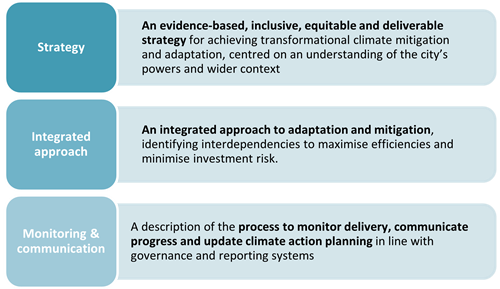On Earth Day 2021, and in a week of a number of significant announcements for climate including the UK’s new climate target for 2035, agreement on the European Climate Law, publication of further details on the EU’s green taxonomy for sustainable finance and the launch of the Glasgow Financial Alliance for Net Zero, Logika Group’s climate specialist, Natalia Reyna, reflects on the critical role that cities play in tackling climate change.
Cities stand in the front line of the global battle to reduce greenhouse gas emissions and create resilience towards the impacts of climate change. By 2050 more than 65% of the world’s population will live in cities. How we design and build the cities of the future will be critical for global sustainable development. Therefore, local and city authorities have a key role to play by planning, guiding and managing emissions reduction strategies, but also by developing sustainable, innovative and inclusive solutions that address adaptation and enhance resilience to extreme climate conditions. The technologies are now available, finance is progressively more accessible, and policies and programmes have been implemented and tested.
In 2016, nations ratified the Paris Agreement, committing to ambitious efforts to keep global average temperature rise to well below 2°C above pre-industrial levels, and to pursue efforts to limit temperature rises to 1.5°C. Whilst commitments have been made at national level, taking ambitious action can often be hampered by political and stakeholder pressures, amongst others. Cities often have greater flexibility, creativity and ambition to take action to tackle climate change as it can also help to address wider environmental issues such as poor air quality. In this context, cities and local authorities around the world are joining the Cities Race to Zero, an unprecedented coalition of cities committed to setting science-based targets and start implementing inclusive and resilient climate action ahead of and beyond the COP26 in Glasgow. The goal is to recruit 1,000 cities to the Race to Zero Campaign, in support of the COP26 Roadmap of Local Governments and Municipal Authorities (LGMA) Constituency to the UNFCCC.
Stronger policy is crucial to transform cities quickly and cost-effectively, to drive down emissions, improve resilience and support city and community action. Cities are already leading the way with ambitious plans to accelerate action on climate change. With policy design, community support and collaboration, cities can make an even greater contribution to securing a climate-safe future. Mexico City‘s Program for Climate Action 2020-2026 is a strong example of actions cities can take to mitigate the effects of climate change while also delivering other co-benefits by improving reforestation, air quality, river cleanliness, mobility, and transportation. The strategy for a fossil-fuel free Stockholm by 2040 demonstrates the commitment of the city to lead on tackling climate change and prove that it is possible to combine well-developed welfare and growth with minimal climate impact.
A city climate action plan should set out a pathway to carbon neutrality ideally by 2050 or sooner, and set ambitious interim targets. The plan must be built using a strong evidence base although this should not necessarily be a barrier to taking action. The plan should take into consideration existing city conditions, including baseline emissions, a climate risk assessment and the identification of socio-economic priorities. It should describe how the city will adapt and improve its resilience to the climate hazards now and in future climate change scenarios. Climate action plans should set out the social, environmental and economic benefits expected from implementation, and improve the equitable distribution of these benefits to all the population. It is essential to outline the city’s degree of control over assets and functions across all the sectors, and to identify the partners who need to be engaged to accelerate the delivery mitigation targets and resilience goals. Indeed, stakeholder engagement (government, business and communities) is critical to foster collaboration and partnerships in the development of climate (or any environmental) action plans. Likewise, elaborating a climate action plan brings an opportunity to unite city government, business and communities, as well as individual and collective responsibility to take action. This will facilitate the transition from planning to delivery and enable the benefits of climate action to be distributed as equitably as possible. In sum, a city climate action plan should have the following components:

The Environmental Policy and Economics Practice at the Logika Group (environmentalpolicyandeconomics.com) has the experience and knowledge base to provide comprehensive support to cities around the world to develop ambitious and equitable climate and air quality action plans. We carry out environmental and economic assessments to identify the cost effective big wins that can deliver integrated actions for climate change and other co benefits such as improved air quality. The technical assistance provided covers a wide range of support including data collection and analysis (comprising GHG and air pollutant emission inventories), socio-economic analysis, training, workshops, stakeholder engagement and more. To find out more, please get in touch: NataliaReyna@logikagroup.com
View all news